Archive for the 'Content Type' Category
Posted by James (admin) on 20th November 2012
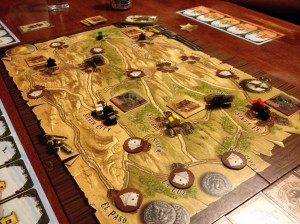 In Desperados, one player is the marshal trying to protect the Wild West from the other players who are all outlaws working together to rob banks, fix poker games and hold-up stage coaches. If the outlaws can gather a total of $4,000 for each outlaw player after 5 rounds, the outlaws win.
In Desperados, one player is the marshal trying to protect the Wild West from the other players who are all outlaws working together to rob banks, fix poker games and hold-up stage coaches. If the outlaws can gather a total of $4,000 for each outlaw player after 5 rounds, the outlaws win.
The gameplay uses an interesting hidden-movement game mechanic as the outlaws try to move to where the sheriffs and marshal are not located so they can steal money and avoid being arrested. (I’ll explain the game mechanic in a bit of detail as it’s the core of the game – it’s actually simple but requires careful explanation.)
GAMEPLAY
The board shows various towns and cities connected by roads – towns have poker game tiles (worth $300-$600), cities have bank tiles (worth $500-$3,200), and stagecoaches move to towns and cities along pre-determined routes (worth $800-$1,200 when robbed). Note that the tiles are random and values hidden so outlaws don’t know exactly what they’re worth.
Wooden figures on the board (meeple) show the locations of each outlaw, the marshal and the sheriffs (1 sheriff per outlaw player). Each outlaw and marshal player has a deck of cards: 1 card showing each town/city plus 1 saloon card. Each of the 5 rounds is split into a planning phase followed by an evaluation phase. Read the rest of this entry »
Tags: board game news, Board Games, board gaming, Desperados, Essen, Spiel 2012
Posted in Board Game Review, Board Games, Desperados, Essen Spiel 12 | 2 Comments »
Posted by James (admin) on 16th November 2012
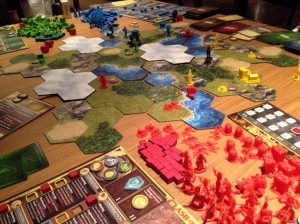
A player board can be seen at the bottom of the picture. Notice the cubes in the square holes marking the advances gained.
Clash of Cultures is a civilisation building game by the designer of Merchants and Marauders and this sole fact meant it was on my ‘must play’ list as Merchants & Marauders was a superb game. In Clash of Cultures, players start as rival tribes in corners of the realm with no technology. Over 6 rounds, the players explore the land, generate resources, build cities, create technologies, trade, potentially fight each other, and do whatever they can to be the most successful. At the end of the game, victory points (VPs) are scored for building cities (1VP per piece), advances in technology (1/2VP each), completing objective cards (2VP each) and building wonders (5VP each) – the player with the most VPs wins.
GAME
The board/map is made of tiles (each showing 4 hexes) of various types: water, mountains, barren, grassland, forest. Unexplored regions remain face-down until entered when a player turns the tile over and sometimes gets a choice on its orientation.
Players all start the same with 1 settler, the Farming and Mining advances and 1 basic city. During the game, cities can be improved by adding a port, academy, temple and/or fortress. The size of a city is equal to the total number of pieces – the bigger the size, the more resources it collects and influence it has; however, city size is limited by the number of cities you own so you can’t just have one super-city. A city that is happy functions like a city of 1 larger size; whereas, an angry city functions like a city of size 1. Read the rest of this entry »
Tags: board game news, Board Games, board gaming, Clash of Cultures, Essen, Spiel 2012, Z-Man Games
Posted in Board Game Review, Board Games, Clash of Cultures, Essen Spiel 12 | No Comments »
Posted by James (admin) on 13th November 2012
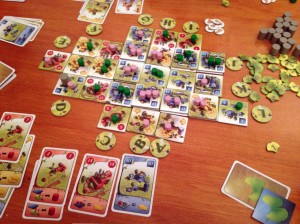
Ginkgopolis is by one of the designers I really like – Xavier Georges (Carson City, Royal Palace, Troyes and Tournay). Ginkgopolis is a game with the theme of futuristic, city building. As with many of Georges’ games, the game mechanic is a bit unusual (it’s actually relatively simple, although it may not seem so at first). As a result, I felt it important to explain the gameplay quite clearly (so please excuse the length of this review) because a brief outline would offer little insight.
GAME
At the start of the game, there are 9 building tiles in a 3×3 grid – 3 red, 3 yellow and 3 blue buildings with values 1, 2 and 3 – surrounded by lettered discs A-L. The initial card deck contains cards for each letter and each of the 9 starting buildings. Players start with some resources (cubes) of their own colour and some building tiles. During the game, the players will add building tiles to the 3×3 grid (on the outside as well as laying new tiles on top of existing ones). Players score victory points (VPs) when placing some tiles, and at game end for controlling areas plus bonus VPs based on cards they own. The player with the most VPs at the end of the game wins. Read the rest of this entry »
Tags: board game news, Board Games, board gaming, Essen, Ginkgopolis, Pearl Games, Spiel 2012, Xavier Georges, Z-Man Games
Posted in Board Game Review, Board Games, Essen Spiel 12, Ginkgopolis | No Comments »
Posted by James (admin) on 6th November 2012
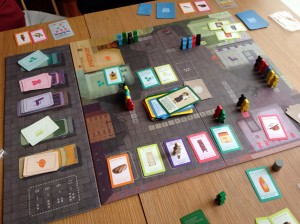 When someone suggests a game about queuing and shortages in Poland in the 1980’s, your first thought is probably to avoid eye contact and back away. However, Kolejka (which is Polish for ‘Queue’ and pronounced col-aay-ka) is actually a gem of a game which I hope gets the attention it deserves as it actually contains a great Eurogame as well as an interesting and fitting theme.
When someone suggests a game about queuing and shortages in Poland in the 1980’s, your first thought is probably to avoid eye contact and back away. However, Kolejka (which is Polish for ‘Queue’ and pronounced col-aay-ka) is actually a gem of a game which I hope gets the attention it deserves as it actually contains a great Eurogame as well as an interesting and fitting theme.
Players are each trying to obtain 10 goods listed on their objective cards – for example, 4 luxury goods, 3 pieces of clothing, 2 food and 1 electrical. The first player to collect all of their items wins, or the player that collects the most of their items by the end of the game.
Each round a few goods will arrive at some of the 5 stores. First, before knowing what will arrive where, players take turns adding any of their people (meeple) who are not in queues to the queues. Then, goods cards are revealed which determine how many goods arrive at which stores, e.g. 2 electrical items at the electrical store, 3 foods at the food store, etc. Read the rest of this entry »
Tags: board game news, Board Games, board gaming, Essen, Kolejka, Poland, Queue, Rebel.pl, Spiel 2012
Posted in Board Game Review, Board Games, Essen Spiel 12, Kolejka (Queue) | No Comments »
Posted by James (admin) on 2nd November 2012
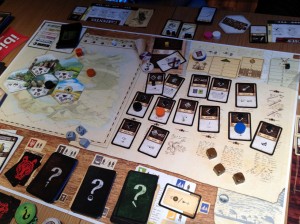 ‘Robinson Crusoe: Adventure on the Cursed Island’ is a co-operative game where players are on a desert island and must fight for their survival whilst trying to achieve a goal (depending upon the scenario being played).
‘Robinson Crusoe: Adventure on the Cursed Island’ is a co-operative game where players are on a desert island and must fight for their survival whilst trying to achieve a goal (depending upon the scenario being played).
Good co-operative games need two very important components. First, the players need to be given interesting/difficult choices so they feel they have input and are playing the game, not merely a passenger. Second, the game must create some random elements (like events) which aren’t too random that they don’t make sense or are overpowered, but also aren’t too predictable or small that they don’t make any difference. Back in the 80’s, Games Workshop released a solo-play game called Chainsaw Warrior which I always hold up as an example of how a game where you play against the game can be done badly. A card deck determined random events but you had little choice and was so random that you could just look through the deck and see if the card order meant you’s almost certainly win or lose. Read the rest of this entry »
Tags: board game news, Board Games, board gaming, Essen, Portal Publishing, Robinson Crusoe, Spiel 2012, stronghold
Posted in Board Game Review, Board Games, Essen Spiel 12, Robinson Crusoe | No Comments »
Posted by James (admin) on 26th October 2012
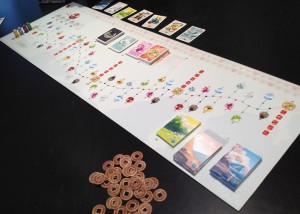 In Tokaido, players are travelling along a road visiting villages, seeing great vistas, visiting temples, staying at inns,etc. in order to earn victory points (VPs). The player with the most VPs at the end of the game wins.
In Tokaido, players are travelling along a road visiting villages, seeing great vistas, visiting temples, staying at inns,etc. in order to earn victory points (VPs). The player with the most VPs at the end of the game wins.
Players move along the road from left to right. On their turn, they can go to any empty space ahead of them (up to the next inn where they must wait for any other travelers to catch-up). Spaces at each location are limited (usually one or two spaces) so a player may not be able to visit a location if it is currently full of other travelers. This is very important because a player can never move backwards along the road.
So, you can rush ahead to ensure you land at a location you want to, but at the cost of never being able to visit any of the skipped locations on your way there. However, moving slowly means opponents may move into the locations you will want to so they could be full when it is your turn and you have to pass them by. The player who is furthest back is the player who moves next – so it’s not wise to move too far ahead of this last player as it will allow them to land on every location between themselves and the next player. Read the rest of this entry »
Tags: board game news, Board Games, board gaming, Essen, Funforge, Spiel 2012, Tokaido
Posted in Board Game Review, Board Games, Essen Spiel 12, Tokaido | 3 Comments »
Posted by James (admin) on 25th October 2012
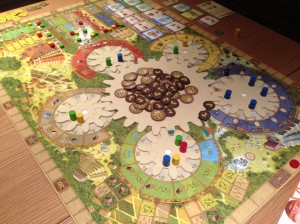 Tzolk’in is a worker placement game with a difference. In this Mayan-themed game, players have around 26 turns in which to impress the gods the most, i.e. earn the most victory points (VPs).
Tzolk’in is a worker placement game with a difference. In this Mayan-themed game, players have around 26 turns in which to impress the gods the most, i.e. earn the most victory points (VPs).
Each turn, players either place any amount of their workers or remove any amount of their workers. Players spend corn to place their workers on the cog(s) they desire taking the cheapest available slot (and the more workers you place in one turn, the more extra corn you must pay too). The unique part of this game is that workers are placed on small cogs which are located around a large central cog. Each turn, the large cog is turned and this turns all the small cogs which moves all of the workers on them along one step. When a player removes a worker, they get the benefit that the worker is next to and the longer a worker remains on a cog, the better the benefit when they are removed. Read the rest of this entry »
Tags: board game news, Board Games, board gaming, Czech Games Edition, Essen, Spiel 2012, Tzolk'in
Posted in Board Game Review, Board Games, Essen Spiel 12, Tzolk'in | 5 Comments »
Posted by James (admin) on 15th October 2012
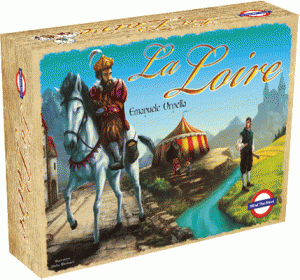 Emanuele Ornella has designed some great games over the last few years (Il Principe, Charon Inc, Assyria). La Loire is his new game this year which looks like a solid euro game. The game is set along the River Loire and players aim to earn as many VPs as possible. Each player has a merchant and a messenger which they move along the roads on both sides of the river – once they start in a direction, they can not go back in the other direction until they reach one of the two cities.
Emanuele Ornella has designed some great games over the last few years (Il Principe, Charon Inc, Assyria). La Loire is his new game this year which looks like a solid euro game. The game is set along the River Loire and players aim to earn as many VPs as possible. Each player has a merchant and a messenger which they move along the roads on both sides of the river – once they start in a direction, they can not go back in the other direction until they reach one of the two cities.
On each turn, the players move their merchant and messenger (in either order) and can take an action at the location each lands on. Players move the number of spaces equal to the number of horses that the piece being moved is on top of (plus 1). The number of horses can change as a player can leave behind any horses they want (any players can use them) or can add one if there are any horses on the space they start from. This sounds like a very interesting game mechanic as you’ll want to help yourself but also hinder others in the taking and leaving of horses.
The core of the game is that the merchant earns the money so that the player can buy messages for the messenger to deliver (or buy boat movement). The merchant’s actions are primarily about buying goods (wood, grain, cheese, wine, beer) and buying buildings. The village location determines what good is available to buy there. Some villages will have farms, monasteries, or castles on them – these are built by the players during the game – and these give discounts (plus beer is only available from monasteries). Read the rest of this entry »
Tags: board game news, Board Games, board gaming, Emanuele Ornella, Essen, La Loire, Mind The Move, Spiel 2012
Posted in Board Games, Essen Spiel 12, La Loire, On the Radar | No Comments »
Posted by James (admin) on 14th October 2012
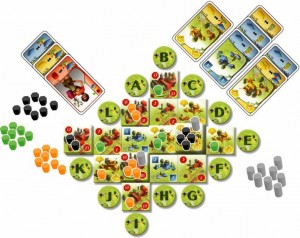 Xavier Georges is one of the designers I really like and it’s good to see he has a new game this year called Ginkgopolis. Carson City, Royal Palace, Troyes and Tournay.
Xavier Georges is one of the designers I really like and it’s good to see he has a new game this year called Ginkgopolis. Carson City, Royal Palace, Troyes and Tournay.
Ginkgopolis is a game of futuristic city building. On their turn, players simultaneously select a card from the 4 cards in their hand. At the end of each round, they will then pass the remaining 3 cards to their neighbour who adds one new card to make a total of 4, and they will select from those on their next turn. That sounds like an interesting card mechanic – sort of like 7 Wonders but continual.
After choosing cards, players resolve their card (which are red, yellow or blue and numbered so each card matches a building). There are three possibilities:
- Gain Resources/Tiles/VPs
Playing a card on its own gains the player resources (their own markers), tiles or VPs (determined by their colour). The amount is based on the height of the matching building (plus bonuses based on items you already gained).
- Build New Building
If the player plays a building tile with their card, they place the new tile where the matching letter is (moving the letter outwards) plus gain any bonuses based on items already gained too. The player places one of their resources (markers) on the building to show their ownership (but this can change during the game). The card matching the new building is added to the draw deck too.
- Develop Existing Building
If the player plays a building tile with their card, they can add the tile to the top of the building shown on the card. The player takes control of the building so they place their marker on it and return any current owner’s markers (for which they get 1VP each) Read the rest of this entry »
Tags: board game news, Board Games, board gaming, Essen, Ginkgopolis, Spiel 2012, Xavier Georges, Z-Man Games
Posted in Board Games, Essen Spiel 12, Ginkgopolis, On the Radar | No Comments »
Posted by James (admin) on 12th October 2012
Shadows Over Camelot Card Game (Days of Wonder)
The original Shadows Over Camelot was an excellent semi co-op game that you could get fairly light gamers to play. The new card game version sounds intriguing as it has many of the same elements but a different core game mechanic. Similar to the board game, it’s co-operative but there may be a traitor. Each turn a player can turn over a card from the deck – many are rumours about the different quests (with icons showing the strength of the rumour) and there are other cards that affect gameplay like players not being allowed to communicate. These cards get added to the ‘threat’ pile. Instead of drawing a new card, a player can choose one of the quest icons on the previously drawn card and go on that quest. This means they sort out the threat pile into the separate quests and activate any Merlin and Morgana cards which can help or hinder the questing player. If the total number of rumour icons for the chosen quest is 11, 12 or 13 then the player succeeds and one of the 7 white swords required to win is gained (otherwise, they gain one of the 7 black swords which will lose the game). However, the rumour icons on the other quests are also added up too and can result in black swords if there are 14+ of their rumour icons. So, it’s a sort of push-your-luck game (with players trying to remember how many icons of each quest have gone past and what other cards are in there too). Like the original game, players can also accuse each other of being a traitor too.
Check out the details and rules at Days of Wonder’s web site: bga.me/soccard
Asgard (What’s Your Game)
What’s Your Game have published some great games in the past (like Vinhos and one of my favourite worker placement games Vasco de Gama). After releasing no new games last year, it’s great to see they have two this year. Asgard is a viking-themed, worker placement game where players place workers (influence) on different locations (gods) with lots of options and interesting decisions. The worker placement is interesting as players secretly select on which gods they will place workers, then take turns revealing one location and placing a worker (which sets the specific action for that god), and then take turns using each worker (and some get benefits for being the first one used on that god). There’s a lot more to it too. For more detailed info, check out my full On The Radar: Asgard piece for more info. Sounds really interesting.
Oddville (What’s Your Game)
Oddville looks like it will contain an interesting mix of tile laying to build a city and using cards to gain resources. Each card can only be used for one of its three uses – cash, resources or buildings – I always like multi-use cards in a game. When players build a building, they place it to expand the city and gain bonuses including gaining characters which give special abilities. At the end of the game, VPs are scored for the buildings each player built (they all score in different ways), characters and remaining resources.
There are some other nice sounding game mechanics too like the way the players pay for resources by putting their worker on one of the limited market prices which determines how much it costs and shows they have that resource until they spend it to build a building. Also, when obtaining a building, the card shows which of the buildings on display are free and which will cost money. So, it sounds like a very interesting and clever eurogame. For more detailed info, check out my full On The Radar: Oddville piece for more info.
James
Tags: Asgard, board game news, Board Games, board gaming, Days of Wonder, Essen, Oddville, Shadows Over Camelot Card Game, Spiel 2012, What's Your Game
Posted in Asgard, Board Games, Essen Spiel 12, Oddville, On the Radar, Shadows Over Camelot Card Game | No Comments »
 In Desperados, one player is the marshal trying to protect the Wild West from the other players who are all outlaws working together to rob banks, fix poker games and hold-up stage coaches. If the outlaws can gather a total of $4,000 for each outlaw player after 5 rounds, the outlaws win.
In Desperados, one player is the marshal trying to protect the Wild West from the other players who are all outlaws working together to rob banks, fix poker games and hold-up stage coaches. If the outlaws can gather a total of $4,000 for each outlaw player after 5 rounds, the outlaws win.








